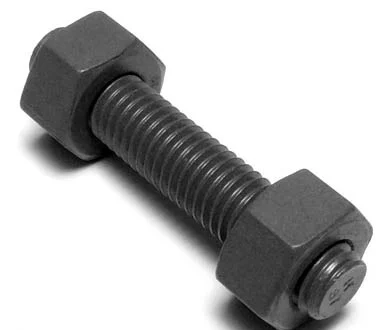In industries that require robust connections under extreme pressure and high temperatures, stud bolts in the B7 2H grade have become a trusted solution. From oil and gas operations to heavy machinery and petrochemical plants, B7 2H stud bolts play a vital role in secure, durable connections. Here, we’ll break down their key features, applications, and benefits, helping you understand why B7 2H stud bolts are a go-to choice in industrial bolting.
What Are Stud Bolts?
Stud bolts B7 2H, particularly those in the grade, stand out in the world of fasteners for their unique design and impressive strength. Threaded on both ends and typically used with heavy hex nuts, B7 2H stud bolts differ from standard bolts by lacking a head, making them highly versatile for connections where powerful clamping is necessary. This structure suits applications like flange connections in piping systems, where high strength and durability are essential.
What Makes B7 2H Stud Bolts Unique?
When we specify a B7 2H stud bolt, we’re highlighting a unique combination of materials and properties designed for high-stress, high-temperature applications.
Stud bolts in the B7 grade use chromium-molybdenum steel (AISI 4140/4142), known for its high tensile strength. Heat treatment strengthens these bolts further, enabling them to endure elevated temperatures and pressures. When paired with 2H heavy hex nuts made from hardened carbon steel, B7 2H bolts create a connection that maximizes load-bearing capacity and stability in demanding conditions.
Key Characteristics of B7 2H Stud Bolts
Several defining characteristics make B7 2H stud bolts ideal for high-stakes industrial applications:
- High Tensile Strength: With tensile strength around 125,000 psi, B7 bolts excel in high-load environments.
- Temperature Resistance: B7 bolts perform well in temperatures up to 450°C (840°F), maintaining their structural integrity.
- Corrosion Resistance: While B7 bolts are not inherently corrosion-resistant, they can be treated with zinc or galvanization coatings to increase their durability in corrosive settings.
- Durability: The combination of B7 grade material with 2H nuts results in a fastener that withstands wear and challenging environmental conditions.
Common Applications of B7 2H Stud Bolts
B7 2H stud bolts prove indispensable across various industrial sectors due to their strength and resilience. Here’s where they make the biggest impact:
- Oil & Gas: In the oil and gas industry, B7 2H bolts securely fasten valves, pressure vessels, and flange connections that operate under high pressure.
- Petrochemical and Refining: Chemical processing plants rely on stud bolts to connect pipelines, reactors, and other heat-exposed equipment.
- Power Generation: B7 2H stud bolts are widely used in high-temperature environments, such as heat exchangers and boilers, essential to power generation.
- Manufacturing and Heavy Machinery: The strength of B7 2H bolts ensures the secure connection of heavy equipment, withstanding wear, vibrations, and variable load conditions.
Installation Tips for B7 2H Stud Bolts
For B7 2H stud bolts to deliver peak performance and maintain safety, proper installation is crucial:
- Torque Specifications: Adhere to the recommended torque values to prevent over-tightening or potential damage.
- Lubrication: Apply lubricant to bolt threads to reduce friction, prevent galling, and ensure a smooth installation process.
- Routine Inspection: Regularly check bolts for signs of wear, corrosion, or loosening to maintain the integrity of connections and avoid safety hazards.
Selecting the Right B7 2H Stud Bolt for Your Application
Selecting the ideal B7 2H stud bolt depends on assessing the specific conditions of your application:
- Environmental Considerations: Evaluate factors like temperature, pressure, and exposure to chemicals to select appropriate material and coatings.
- Size and Length: Match the bolt length, diameter, and thread pitch to engineering specifications for a precise fit.
- Standards Compliance: Ensure B7 2H bolts meet ASTM A193 (for bolts) and ASTM A194 (for nuts) standards, which certify them for industrial applications.
Benefits of B7 2H Stud Bolts
B7 2H stud bolts are valued for their exceptional performance under high-pressure and high-temperature conditions:
- Reliability: B7 2H bolts provide dependable stability even in the most challenging environments, ensuring critical equipment remains securely fastened.
- Strength: With their high tensile strength, B7 2H bolts withstand extreme loads without compromising connection integrity.
- Heat Resistance: B7 2H bolts maintain their structural strength in high-temperature settings, essential in many industrial applications.
Potential Drawbacks of B7 2H Stud Bolts
Despite their advantages, B7 2H stud bolts may not suit every application:
- Limited Corrosion Resistance: Without protective coatings, these bolts may not fare well in highly corrosive environments.
- Higher Cost and Maintenance: B7 2H bolts often cost more than standard bolts and may require regular inspection and maintenance to ensure long-term performance.
Conclusion
B7 2H stud bolts stand as an industry standard for high-stress, high-temperature environments. Their high-tensile B7 steel paired with hardened 2H nuts ensures secure, durable connections essential in oil & gas, petrochemical, and power generation industries. By understanding the specifications, installation requirements, and maintenance practices for B7 2H stud bolts, you can count on reliable performance and safety in demanding applications.
 Diverse Perspectives: Insights & Stories Exploring Ideas, Sharing Knowledge
Diverse Perspectives: Insights & Stories Exploring Ideas, Sharing Knowledge





